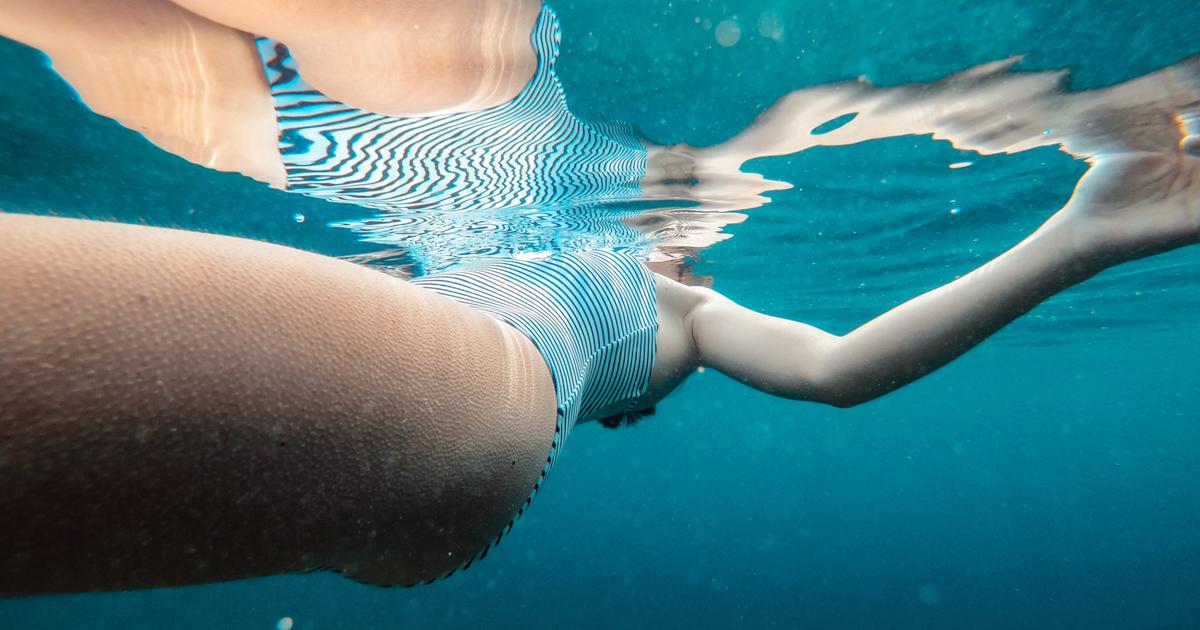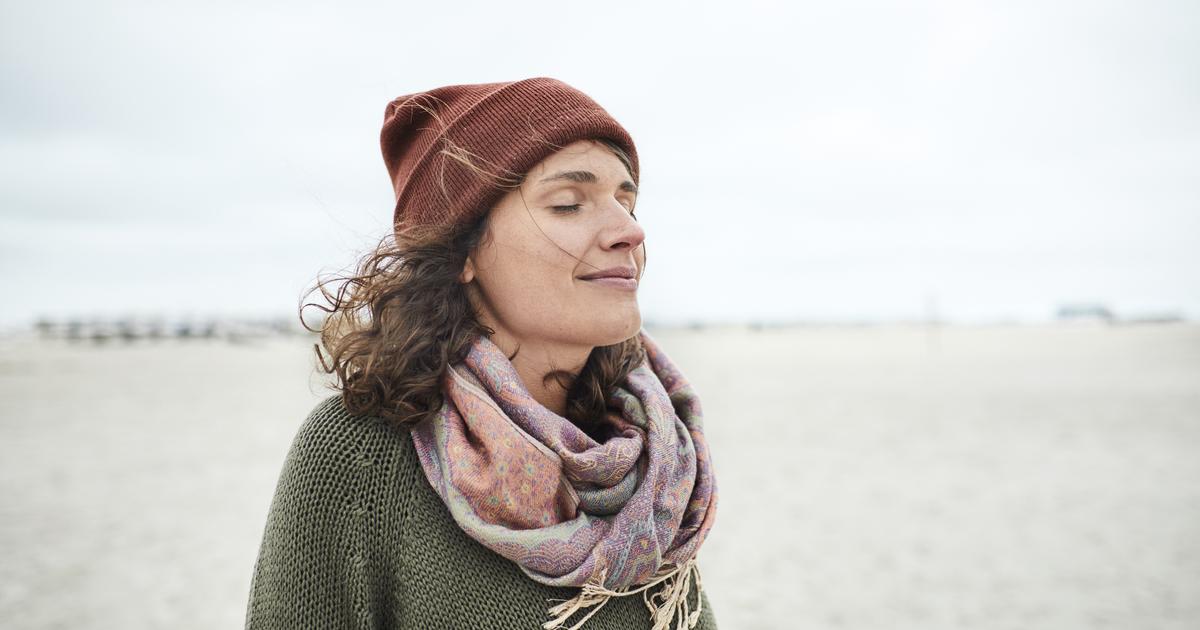Faced with the summer heat, the beaches and water points are taken by storm.
In France, on the Mediterranean coasts, the water temperature rarely drops below 20°C.
It is therefore necessary to go up to the English Channel to find freshness there, and temperatures similar to those of mountain lakes.
No offense to the chilly, swimming in cold water has many advantages, both physically and mentally, as confirmed by Guillaume Barucq, general practitioner and author of
Surf Therapy
(1), and Marie Perez Siscar, general practitioner and president Côté Thalasso centres.
Read alsoEnergizing, antiviral, anesthetic… The unsuspected benefits of cold
Strengthen your blood circulation
Like any physical activity, swimming stimulates the cardiovascular system and makes the heart more enduring.
In addition, even without doing lengths, we observe effects on the vascularization by simply starting by soaking our legs.
“Walking in cool water activates the muscles of the thighs and calves, and at the same time revitalizes blood circulation, thus improving venous return,” says Dr. Marie Perez Siscar.
By immersing yourself completely in a sea between 9 and 16°C, you would somehow help to “strengthen your arteries”, according to Guillaume Barucq, general practitioner in Biarritz.
“In contact with cold water, blood vessels constrict and the body redirects blood to vital organs.
This is called “vasoconstriction”.
Coming out of the water, it's the opposite.
“Vasodilation” occurs, i.e. an increase in the diameter of the vessels and in blood flow,” explains the healthcare professional.
By warming up, the body will then unclog the internal organs, promote oxygen exchange and muscle relaxation.
In video, why it is good to sweat
Let those in a hurry, on the other hand, refrain from taking a dip too prematurely.
“A too sudden temperature difference can cause discomfort, even hydrocution”, warns Dr Guillaume Barucq.
The ideal, according to the general practitioner, is to gradually enter the water, without warming up the body beforehand and by moistening the face then the neck, to allow “good thermoregulation of the body”.
In addition, health professionals insist on the importance of having a medical check-up before embarking on low-temperature swimming, especially if you are over 50 and/or have a history of heart disease.
Calorie burner?
When the body is immersed in cold water, it will almost automatically use its muscles to fight against heat loss, says general practitioner Marie Perez Siscar.
“By contracting our limbs more, this will require the body to redouble its energy, therefore to tap into our fat reserves and burn a few calories,” she summarizes.
The cold, by contracting our limbs more, will ask the body to redouble its energy, therefore to draw on our fat reserves.
Dr Marie Perez Siscar
In the sea, more than in a lake, the waves model the silhouette more, assures the specialist: "They have a thermomassage effect which will contribute to toning and firming the skin".
Read alsoDo we burn more calories when it's cold?
Immunity Shield
In the various reports on the subject, those who defy the mercury often attest to "never getting sick again" since they adopted the cold version of swimming.
According to Dr. Guillaume Barucq, exposure to cold would indeed strengthen the immune defences.
"In Norway, it is customary to expose young children to the cold from an early age to help them become more resistant to low temperatures," he reports.
In addition, the wealth of microorganisms in the marine environment plays a protective role.
By exposing yourself to this diversity, you then allow the immune system to become better accustomed to the different bacteria and microbes.
For the president of Côté Thalasso Marie Perez Siscar, this shield effect comes mainly from the lifestyle associated with this swim.
"Generally swimmers not only practice this physical activity on a regular basis and accompany it with a more balanced diet," she adds.
Precious painkiller
In the event of a sprain or trauma, the bag of frozen peas is easily unsheathed to avoid swelling.
The principle remains the same in a sea at low temperature.
As Dr Guillaume Barucq explains, cold water reduces inflammatory and joint pain, thanks to a double effect.
“First, the cold acts like an analgesic on the pain and slows down the inflammatory process, he specifies.
Then, the pressure of the water associated with the saline nature of the sea contributes to the floating of the body in weightlessness and to its gentle movement, much more easily than on dry land.”
Good for morale
Health professionals are convinced: despite the cries caused by its contact, the cold would boost morale.
In reality, the slight thermal shock caused by swimming at low temperature allows the synthesis of different neurotransmitters, says general practitioner Guillaume Barucq.
"This process releases endorphins, also known as pleasure hormones, but also serotonin and dopamine, two hormones that are essential for regulating our emotions and energy," he says.
Precautions and red flags
The ice bath in the fjords is obviously not recommended for beginners.
“The colder the water, the more it is advisable to shorten swimming,” points out Dr Guillaume Barucq.
In principle, it takes as many minutes as degrees.
For example, in water at 12°C, you won't stay longer than 12 minutes.
It is possible to equip yourself with a wetsuit or even a hat, gloves and slippers to prevent heat loss at the extremities.
In case of chills, ants, fatigue or any other uncomfortable feeling, specialists invite you to get out of the water without further delay.
"After the bath, we dry off, we get dressed quickly to avoid shivering, we hydrate and we get back in motion by walking", suggests the general practitioner.
Added to this is a relatively relaxing landscape.
“Looking at the sea, you completely empty your mind.
And the breathing of marine aerosols, rich in mineral salts, reinforces this relaxation,” says Dr. Marie Perez Siscar.
To indulge in this particular swim, it is imperative to be accompanied by a loved one or a practitioner in order to be rescued as soon as possible in the event of danger, discomfort, or even hypothermia.
The collective aspect is also beneficial to mental health.
“This activity is generally practiced in groups, in particular via clubs, comments Guillaume Barucq.
This collegial atmosphere improves social bonds, intellectual stimulation and undoubtedly mood.
It is enough to observe the swimmers at the end of the bath: one clearly distinguishes their laughter, even giggles.
(1) Guillaume Barucq is the author of
Surf Therapy, healing in contact with the ocean,
published by Surf Prevention, 224 pages, 25€.











